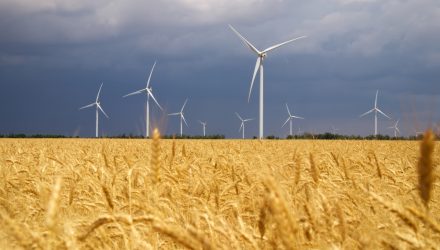Russia’s instigated war with neighboring Ukraine is ongoing, and over approximately two months of armed conflict in Eastern Europe, it’s been common for market observers and politicians to call for the renewable energy transition to be sped up.
That’s a practical response to soaring natural gas and oil prices and one that carries implications for myriad exchange traded funds, including the SPDR Kensho Clean Power ETF (CNRG). CNRG follows the artificial intelligence-based S&P Kensho Clean Power Index.
CNRG could be a credible consideration over the near term despite broader equity market weakness because some governments are ratcheting up renewable energy efforts or realizing that they need to do so.
“As Europe looks to cut its dependence on Russian fuel imports, the region is seeking alternative fossil fuel supplies and is willing to pay a premium, putting further pressure on prices. In response, fuel suppliers are starting to divert supplies from growth markets such as Asia to Europe,” notes IHS Markit.
CNRG’s 45 holdings have a weighted average market capitalization of nearly $50 billion. That’s a testament to the notion that some large-cap companies can play pivotal roles in the renewable energy transition. CNRG taps into that theme with exposure to electric utilities and energy transportation companies.
“While in the short term, some markets may revert to coal generation to ensure supply reliability, in the medium to long term, there will likely be a push to accelerate the energy transition and eventually wean off fossil fuel dependence—although the pace of transition will likely be different in different regions. An accelerated energy transition could also mean lower cumulative carbon emissions, even if emissions increase or stall in the short term,” according to IHS Markit.
CNRG also allocates 13% of its weight to semiconductor stocks, 9.37% to renewable energy providers, and more than 3% to companies with electric vehicles, indicating that it has robust exposure to the broader green energy ecosystem. That’s a favorable trait given the different clean energy needs facing various corporations and governments.
“Accelerating the clean energy transition, however, highlights other challenges that will need to be addressed. One important challenge relates to infrastructure,” adds Markit. “In Europe, local opposition to the development of renewables and associated infrastructure remains a significant barrier to the region’s renewable ambition. In the United States, hundreds of gigawatts of renewables capacity are held up in interconnection queue backlogs, increasing costs and throttling the rate of additions.”
For more news, information, and strategy, visit the ESG Channel.
The opinions and forecasts expressed herein are solely those of Tom Lydon, and may not actually come to pass. Information on this site should not be used or construed as an offer to sell, a solicitation of an offer to buy, or a recommendation for any product.

